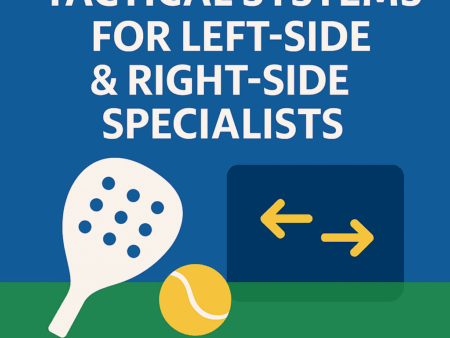The Ultimate Guide to Padel Betting
Everything you need to understand padel betting.

Padel is not only a technical and tactical sport — it is a psychological battlefield. At the top level, players with similar skills are separated by their ability to manage pressure, momentum, emotions, and communication under extreme intensity.
This guide breaks down the psychological pillars that drive elite performance and match outcomes in modern padel.
🧠 Why Psychology Matters More in Padel Than Tennis
Padel is a doubles sport, meaning:
✔ Four emotional systems interact
✔ Two players must stay mentally aligned
✔ Micro-errors affect both partners
✔ Communication becomes a skill, not a bonus
A mentally unstable pair — even two great players — can lose to a stable but less-skilled duo.
🟦 1. Pressure Management (Golden Points & Crucial Moments)
Golden Points expose psychological strength.
Teams with strong pressure profiles:
✔ slow down their breathing
✔ commit to a clear planned play
✔ trust their partner fully
Teams who struggle:
❌ rush decisions
❌ hesitate on overheads
❌ miscommunicate at the net
Elite Traits:
- Calm emotional baseline
- Automatic routines between points
- No visible panic after errors
🟩 2. Confidence Cycles (How Momentum Affects the Mind)
Momentum changes create emotional cycles:
🔼 Positive cycle:
- Higher energy
- Sharper footwork
- More aggressive net positioning
🔽 Negative cycle:
- Complaints
- Passive shot selection
- Reduced reaction speed
Elite teams recognise these cycles early and intervene.
🟨 3. Attentional Focus (Where the Mind Looks During Play)
Elite players maintain narrow, actionable focus.
They pay attention to:
✔ opponent positioning
✔ spacing between players
✔ lobs trajectory
✔ centre-court control
Non-elite players focus on:
❌ fear of losing
❌ previous mistakes
❌ crowd noise
Attention decides shot quality.
🟥 4. Emotional Connection Between Partners
Doubles psychology = two minds operating as one system.
Elite teams demonstrate:
✔ constant verbal cues
✔ synchronised movements
✔ no blame culture
✔ fast emotional recovery
Weak teams:
❌ argue after mistakes
❌ disconnect during tough moments
❌ freeze under pressure
Chemistry often wins tight matches.
🟦 5. Stress Responses Under Momentum Swings
When momentum shifts, even favourite teams can collapse.
Signs of psychological stress:
❌ rushed smashes
❌ flat-footed reactions
❌ hesitation on lobs
❌ unnecessary risk shots
Elite teams stabilise themselves with rituals:
✔ towel routine
✔ three deep breaths
✔ verbal reset (“we go again”)
🟩 6. The Role of Identity & Playing Style
Each player identifies as:
• attacker
• defender
• strategist
• finisher
Psychological harmony requires both partners to:
✔ understand their identity
✔ avoid role conflict
✔ trust the other’s strengths
When roles blur → decision chaos happens.
🟨 7. Reading Opponent Psychology (Massive Advantage)
Elite teams scan opponents for:
✔ emotional leaks
✔ frustration reactions
✔ communication breakdowns
✔ predictable behaviours under stress
Once detected, they attack the weakness.
Example:
If a player avoids hitting overheads under pressure → use high, deep lobs.
🟧 8. Psychological Momentum Triggers
Momentum can be intentionally created.
Triggers include:
✔ winning long rallies
✔ loud celebration after Golden Points
✔ energising the crowd
✔ targeted pressure on weaker opponent
Elite teams use psychology proactively, not reactively.
🟫 9. Mental Endurance (Third-Set Champions)
Champions remain emotionally stable when fatigue rises.
They maintain:
✔ consistent communication
✔ disciplined shot selection
✔ structured decision-making
Many upsets occur in third sets because the favourite’s mental endurance collapses.
🟥 10. Pre-Match Psychological Preparation
Elite players use routines such as:
✔ visualisation
✔ breathing exercises
✔ coordinated warm‑up with partner
✔ strategy review (roles, plays, patterns)
This ensures emotional synchronisation from point 1.
🟦 Quick Psychology Checklist (For Analysts & Coaches)
✔ How do they behave after losing big points?
✔ Do they argue or self-correct?
✔ Who controls emotional tone of the pair?
✔ Do they panic when defending the glass?
✔ Is their communication sharp or silent?
These cues predict performance as strongly as technical ability.
🟩 Summary
Psychology is the invisible engine of elite padel.
Matches are decided by:
- pressure management
- confidence cycles
- partner connection
- mental endurance
- stress behaviour
Understanding psychology provides a massive analytical advantage for players, coaches, and bettors.
Next: Page 2 — Biomechanics of Padel Shots (Power, Control, Efficiency).


